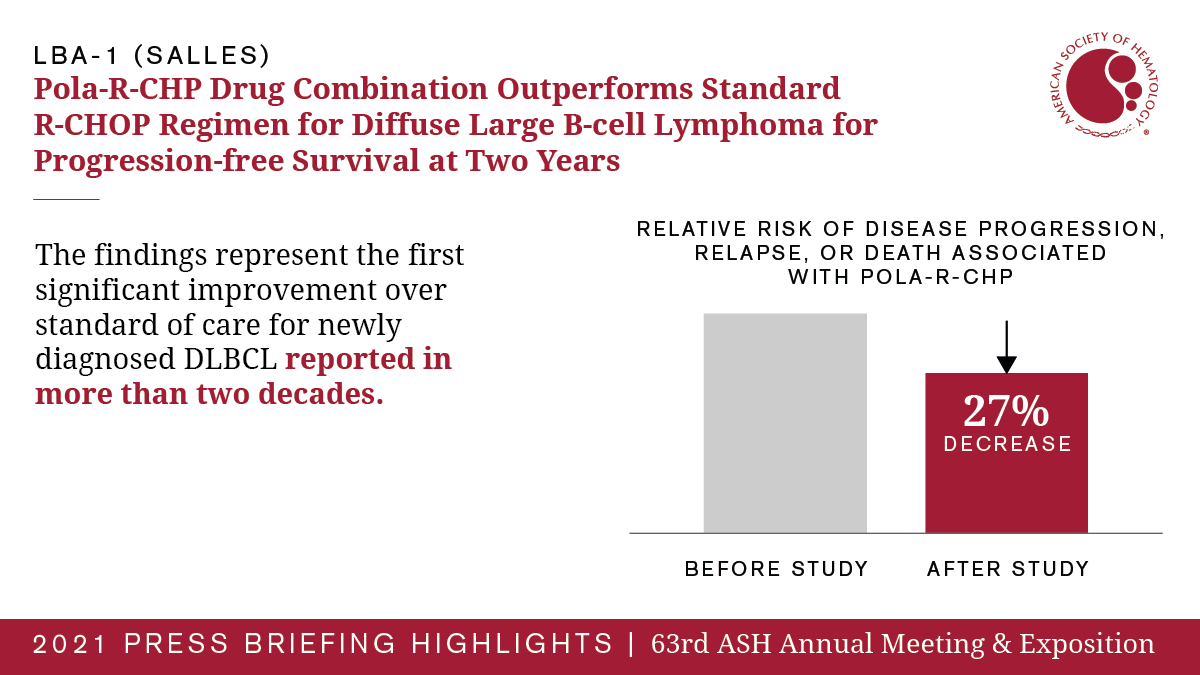Pola-R-CHP Drug Combination Outperforms Standard R-CHOP Regimen for Diffuse Large B-cell Lymphoma for Progression-free Survival at Two Years
Study in ASH Late-Breaking Abstracts session represents the first significant improvement over standard of care for newly diagnosed DLBCL
(WASHINGTON, Dec. 14, 2021) – A new trial found patients with diffuse large B-cell lymphoma (DLBCL) had a significantly higher likelihood of survival without disease progression two years after receiving a new drug combination known as pola-R-CHP compared with those who received the standard of care, a combination known as R-CHOP. The findings, presented at the 63rd American Society of Hematology (ASH) Annual Meeting and Exposition, represent the first significant improvement over standard of care for newly diagnosed DLBCL reported in more than two decades, according to the authors. Although the trial found no significant difference in complete response rates or overall survival at two years, those who received the new drug combination were less likely to need additional treatment compared with those receiving R-CHOP.
“I think this could be a practice-changing result,” said Gilles Salles, MD, PhD, Chief of the Lymphoma Service at Memorial Sloan Kettering Cancer Center (MSK). “This is the first randomized phase III study that has shown a benefit in patients with first-line DLBCL. It shows that it is possible to significantly reduce disease progression, including in patients with difficult-to-treat subtypes.”
R-CHOP, the current standard of care which consists of a combination of rituximab, cyclophosphamide, doxorubicin, vincristine, and prednisone, is curative in only about 60-70% of patients with newly diagnosed DLBCL. The new study compared R-CHOP to a modified drug combination that omits vincristine and includes polatuzumab vedotin along with rituximab, cyclophosphamide, doxorubicin, and prednisone (pola-R-CHP). Polatuzumab vedotin was previously approved for treating patients with relapsed DLBCL.
“With this disease, it can be difficult to achieve a cure in some patients with more extensive disease or older age,” said Dr. Salles, pointing to a need for therapies that work better for higher-risk patients. “Despite the fact that a high percentage respond initially to R-CHOP, many ultimately relapse after therapy is completed.”
The trial enrolled 879 patients with previously untreated DLBCL in 23 countries. Half of the participants were randomly assigned to receive pola-R-CHP and half to receive R-CHOP. At two years, 76.7% of those receiving pola-R-CHP and 70.2% of those receiving R-CHOP survived without disease progression or relapse. The trial met its primary endpoint with a 27% reduction in the relative risk of disease progression, relapse, or death associated with pola-R-CHP.
The results also showed a significant improvement with pola-R-CHP in terms of secondary endpoints, event-free survival, and disease-free survival. However, there was no significant difference in the rate of complete response to treatment, which was seen in 78% of those receiving pola-R-CHP and 74% of those receiving R-CHOP, or overall survival at two years (88.7% and 88.6% for pola-R-CHP and R-CHOP, respectively). Researchers noted that further follow-up could help elucidate whether pola-R-CHP brings a survival benefit in the longer term. In either case, Dr. Salles said the new regimen should reduce the risk of relapse and help patients avoid intensive treatments such as stem cell transplantation and chimeric antigen receptor (CAR) T-cell therapy.
Study participants on both treatments experienced a similar rate of adverse events, which included low blood cell counts and peripheral neuropathy, a condition causing weakness, numbness, or pain in the hands and feet. The rate of drug dose reduction or drug discontinuation was similar in both groups. “It is quite satisfying that we were able to improve outcomes without significantly impairing patients’ quality of life,” said Dr. Salles.
The trial will continue to follow participants for insights into longer-term outcomes. In addition, researchers are analyzing patient subgroups to determine whether tumor biology or other factors may influence which patients are likely to benefit most from the new drug combination.
This international study was sponsored by Genentech, Inc. and F. Hoffmann-La Roche Ltd, and designed by the sponsor in collaboration with the cooperative group LYSA (the Lymphoma Study Association).
Dr. Salles has provided consulting and advisory services to Roche and Genentech.
Herve Tilly, Centre Henri Becquerel and University of Rouen, Rouen, France, will present this study during an oral presentation on Tuesday, December 14, at 9:00 a.m. Eastern time in Hall C2-C3.
Press Briefing Highlights

Additional press briefings took place throughout the meeting on immunotherapy, new insights into blood disorders, COVID-19, and diversifying care in acute leukemia. For the complete annual meeting program and abstracts, visit www.hematology.org/annual-meeting. Follow ASH and #ASH21 on Twitter, Instagram, LinkedIn, and Facebook for the most up-to-date information about the 2021 ASH Annual Meeting.
The American Society of Hematology (ASH) (www.hematology.org) is the world’s largest professional society of hematologists dedicated to furthering the understanding, diagnosis, treatment, and prevention of disorders affecting the blood. For more than 60 years, the Society has led the development of hematology as a discipline by promoting research, patient care, education, training, and advocacy in hematology. ASH publishes Blood (www.bloodjournal.org), the most cited peer-reviewed publication in the field, and Blood Advances (www.bloodadvances.org), an online, peer-reviewed open-access journal.
Contact:
Leah Enser, American Society of Hematology
[email protected], 202-552-4927